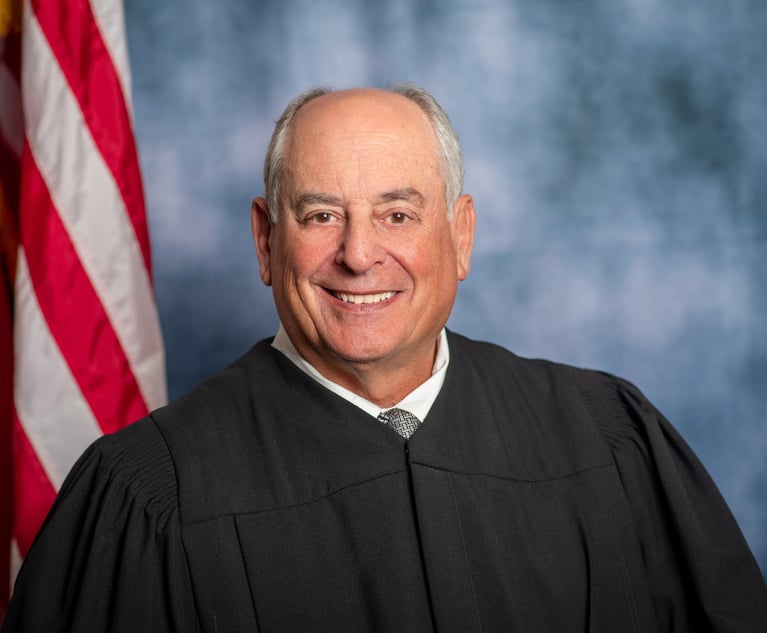 Jackie Patterson of The Patterson Firm (Courtesy photo)
Jackie Patterson of The Patterson Firm (Courtesy photo)Appeals Ruling Threatens Traffic Tickets, Winning Lawyer Says
Solicitor responds that the decision isn't "catastrophic."
January 25, 2019 at 04:28 PM
3 minute read
A lawyer says his win Friday in the Georgia Court of Appeals upends 40 years of law and could jeopardize outstanding traffic tickets throughout the state.
A three-judge panel held that a uniform traffic citation for following too closely wasn't detailed enough to support the charge against Antonio Strickland, whose mother's boss is Jackie Patterson, a traffic court lawyer.
Patterson represented Strickland and argued the Clayton County officer who issued the traffic ticket failed to allege the essential elements of the offense—listing only the name of the offense and the code section: “Following to[o] close[ly] in violation of code section 40-6-49.”
 Judge Trent Brown, Georgia Court of Appeals. (Photo: John Disney/ALM)
Judge Trent Brown, Georgia Court of Appeals. (Photo: John Disney/ALM)“The citation fails to allege any facts necessary to establish a violation,” wrote Judge Trent Brown, joined by Presiding Judge M. Yvette Miller and Judge Steve Goss. “While it indicates an accident occurred, the citation does not provide any details. It is unclear from the citation how the accident occurred, how many vehicles were involved, at what speeds the vehicles were traveling and the approximate distance between the vehicles.”
Patterson was elated. “I've been making this argument since the day I became a lawyer” in 1992, he said. “Due process is back.”
Patterson, whose co-counsel on the case was Brandon Dixon, said that, as a result of the decision, “Every municipal court and every solicitor has to change the way they do business.”
Clayton County Solicitor Tasha Mosley chuckled at that suggestion. “It's not catastrophic,” she said of the decision.
“This will require our officers to get more specific” in describing allegations. And if a ticket doesn't have enough detail, she added, her office can review a police report and produce an accusation that usurps the citation.
The downside of the formal accusation, she said, is that defendants who'd normally plead nolo contendere and pay a small fine online would have to show up in court.
Mosley said she had not decided whether she'd ask the state Supreme Court for review.
Patterson sounded confident, if the matter goes to the high court, because the decision is based on the justices' 2017 decision that reversed a sex offender's conviction for failing to notify authorities that he'd changed addresses.
Justice Robert Benham wrote for a unanimous court that defeating a motion to quash an indictment “requires more than simply alleging the accused violated a certain statute.”
Such an indictment “would not provide the accused with due process of law in that it would not notify the accused of what factual allegations he must defend in court,” Benham wrote. “Likewise, it would not allege sufficient facts from which a trial jury could determine guilt if those facts are shown at trial.”
This content has been archived. It is available through our partners, LexisNexis® and Bloomberg Law.
To view this content, please continue to their sites.
Not a Lexis Subscriber?
Subscribe Now
Not a Bloomberg Law Subscriber?
Subscribe Now
NOT FOR REPRINT
© 2024 ALM Global, LLC, All Rights Reserved. Request academic re-use from www.copyright.com. All other uses, submit a request to [email protected]. For more information visit Asset & Logo Licensing.
You Might Like
View All
'A 58-Year-Old Engine That Needs an Overhaul': Judge Wants Traffic Law Amended
3 minute read
Fulton Jury Returns Defense Verdict After Pedestrian Killed by MARTA Bus
8 minute read
'The Best Strategy': $795K Resolution Reached in Federal COVID-Accommodation Dispute
8 minute read
Population and Caseload Boom Birth New West Georgia Judicial Circuit
7 minute readTrending Stories
- 1Life, Liberty, and the Pursuit of Customers: Developments on ‘Conquesting’ from the Ninth Circuit
- 2Biden commutes sentences for 37 of 40 federal death row inmates, including two convicted of California murders
- 3Avoiding Franchisor Failures: Be Cautious and Do Your Research
- 4De-Mystifying the Ethics of the Attorney Transition Process, Part 1
- 5Alex Spiro Accuses Prosecutors of 'Unethical' Comments in Adams' Bribery Case
Who Got The Work
Michael G. Bongiorno, Andrew Scott Dulberg and Elizabeth E. Driscoll from Wilmer Cutler Pickering Hale and Dorr have stepped in to represent Symbotic Inc., an A.I.-enabled technology platform that focuses on increasing supply chain efficiency, and other defendants in a pending shareholder derivative lawsuit. The case, filed Oct. 2 in Massachusetts District Court by the Brown Law Firm on behalf of Stephen Austen, accuses certain officers and directors of misleading investors in regard to Symbotic's potential for margin growth by failing to disclose that the company was not equipped to timely deploy its systems or manage expenses through project delays. The case, assigned to U.S. District Judge Nathaniel M. Gorton, is 1:24-cv-12522, Austen v. Cohen et al.
Who Got The Work
Edmund Polubinski and Marie Killmond of Davis Polk & Wardwell have entered appearances for data platform software development company MongoDB and other defendants in a pending shareholder derivative lawsuit. The action, filed Oct. 7 in New York Southern District Court by the Brown Law Firm, accuses the company's directors and/or officers of falsely expressing confidence in the company’s restructuring of its sales incentive plan and downplaying the severity of decreases in its upfront commitments. The case is 1:24-cv-07594, Roy v. Ittycheria et al.
Who Got The Work
Amy O. Bruchs and Kurt F. Ellison of Michael Best & Friedrich have entered appearances for Epic Systems Corp. in a pending employment discrimination lawsuit. The suit was filed Sept. 7 in Wisconsin Western District Court by Levine Eisberner LLC and Siri & Glimstad on behalf of a project manager who claims that he was wrongfully terminated after applying for a religious exemption to the defendant's COVID-19 vaccine mandate. The case, assigned to U.S. Magistrate Judge Anita Marie Boor, is 3:24-cv-00630, Secker, Nathan v. Epic Systems Corporation.
Who Got The Work
David X. Sullivan, Thomas J. Finn and Gregory A. Hall from McCarter & English have entered appearances for Sunrun Installation Services in a pending civil rights lawsuit. The complaint was filed Sept. 4 in Connecticut District Court by attorney Robert M. Berke on behalf of former employee George Edward Steins, who was arrested and charged with employing an unregistered home improvement salesperson. The complaint alleges that had Sunrun informed the Connecticut Department of Consumer Protection that the plaintiff's employment had ended in 2017 and that he no longer held Sunrun's home improvement contractor license, he would not have been hit with charges, which were dismissed in May 2024. The case, assigned to U.S. District Judge Jeffrey A. Meyer, is 3:24-cv-01423, Steins v. Sunrun, Inc. et al.
Who Got The Work
Greenberg Traurig shareholder Joshua L. Raskin has entered an appearance for boohoo.com UK Ltd. in a pending patent infringement lawsuit. The suit, filed Sept. 3 in Texas Eastern District Court by Rozier Hardt McDonough on behalf of Alto Dynamics, asserts five patents related to an online shopping platform. The case, assigned to U.S. District Judge Rodney Gilstrap, is 2:24-cv-00719, Alto Dynamics, LLC v. boohoo.com UK Limited.
Featured Firms
Law Offices of Gary Martin Hays & Associates, P.C.
(470) 294-1674
Law Offices of Mark E. Salomone
(857) 444-6468
Smith & Hassler
(713) 739-1250






